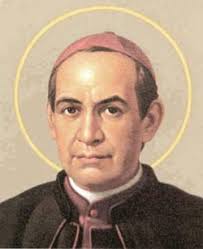HOMILY WEEK 29 06 – Year II
Balancing Faith and Repentance:
Optional Memorial of St. Anthony Mary Claret
(Eph 4:7-16; Ps 122; k 13:1-9)
******************************************
“Repent and believe in the good news” (Mark 1:15) are the first words Jesus preached as he began his public ministry.
The readings today continue that double message of faith and repentance, inviting us to live it more fully in our lives through personal transformation and selfless ministry, building up the body of Christ.
The gospel, touching on the mystery of suffering as it does, leads Jesus to teach the crowds about the importance of repentance. In so doing, he resonates with the wisdom of the 12 Step program – we are not so much punished for our sins and character defects, as much as we are punished by them. What Jesus is teaching is that if we do not repent and change our sinful ways, we will have to suffer the consequences of our own behaviour.
In other words, if we do not believe in him as the Messiah who came to redeem and sanctify, to forgive and heal, then repent and come to him to receive his forgiveness and healing, our false pride, stubborn self-will, selfishness, tendency to judge, sense of entitlement, etc. will remain intact, and we will just stay proud, stubborn, selfish, judgmental persons with an unfortunate sense of entitlement.
The word repentance in Greek is metanoia, which comes from meta, meaning highest, and nous, meaning mind. So, the coming of Jesus as the Messiah and our Lord and Savior means a radical shift in our life, our whole way of thinking, feeling and acting, entering into a whole new world view. Jesus has come to make a difference in our lives, and we can allow him to do that through our faith in him and willingness to repent. As Franciscan Richard Rohr likes to say, “transformed people transform people!”
In the first reading, St. Paul paints an inspiring picture of faith for the Ephesians, and us. We have all been given grace according to the measure of Christ’s gift. The one who ascended to the heavens, also descended into the depths of the earth, into the darkest corners of our human sin and sinfulness, so that he could transform that darkness into pure heavenly light.
Forgiven and healed through our repentance and faith in Christ, we will be transformed into Christlikeness, “maturing into the full stature of Christ” (Ephesians 4:13). We are then all given gifts, each in our own unique way, making us solidly grounded in faith and the love of God, and equipped to build up the body of Christ, the church.
We may not see ourselves as prophets or evangelists, but think again – every person in the body of Christ is a teacher as well as a learner. We are all disciples, or mathetes, which means a learner, so we are always learning what it means to follow Jesus. But each of us also has our own expertise in both practical and spiritual matters. Our aptitudes and experiences are necessary to build up the Church. We are called to recognize our gifts, however humble they might be.
Maybe we have learned from experience how to run a household, or we are handy around the house. Or perhaps we have studied Scripture and can share our insights. We may be able to show someone how to navigate some new skill by walking along him or her until they are able to perform a task. That is what a good teacher does. Even if our skills don’t seem all that impressive to us, we can still be a wonderful teacher of how to love and how to pray.
Each of us is meant to use our gifts to equip and build up our brothers and sisters in Christ. It takes all of us working together to come to the “full stature of Christ”. We must believe we are an integral part of the body of Christ. We have been blessed by God, and God wants us to share those blessings with our brothers and sisters.

St Anthony Mary Claret
Today the church invites us to honour St. Anthony Mary Claret. Born in Spain in 1807, Anthony Claret, a weaver like his father, studied Latin and printing in his spare time. He entered the seminary at 22 and was ordained in 1835. For 10 years he preached missions and gave retreats throughout Catalonia and in 1849 founded a congregation known as the Claretians. Shortly afterward, he was appointed archbishop of Santiago in Cuba, where he brought reform both to the clergy and the laity. He stayed until 1857, when he returned to Spain and became confessor to Queen Isabella II. He combined this assignment with overseeing the activities of his congregation, preaching and publishing books and pamphlets. In the revolution of 1868 both Anthony and the queen were exiled. After attending Vatican I, Anthony sought refuge at a Cistercian monastery in France, where he died in 1870. He was canonized in 1950.
The Eucharist is both a profound act of faith in God’s word and the real presence of Jesus in communion, as well as an experience of repentance. May our celebration deepen our faith in Jesus, open us up to his forgiveness and healing, and empower us to go out and use our gifts and talents to build up the body of Christ, as did St. Anthony Mary Claret.



